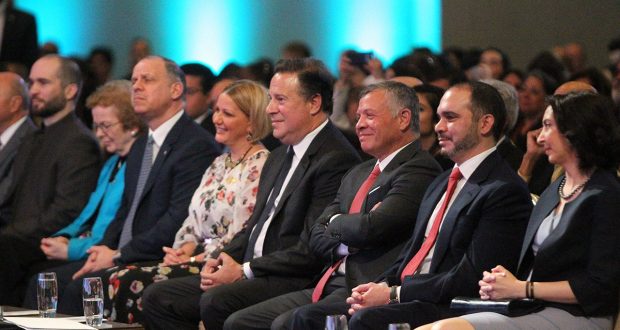For our Children

President Juan Carlos Varela and the first Lady Lorena de Castillo Varela are in Jordan attending the Laureates and Leaders for Children Summit 2018, taking place March 26th and 27th, 2018.
The event, founded by Nobel Peace Laureate Kailash Satyarthi, brings together Nobel laureates, global leaders, and youth from around the world to inspire, collaborate and act to protect the most vulnerable children.
Yesterday president Varela spoke. The president called on world governments, civil society and the private sector to collaborate on implementing public policies and put an end to child labor and the violation children’s rights. The president added he hoped Panama would become the first Latin American country to completely eradicate child labor.
President Juan Carlos Varela addressed Panama’s process of ensuring children’s rights. He said that Panama has made a commitment to children, to ensure that they have full access to health, education and a safe environment.
“We are pleased that, through a collaborative effort of different sectors of our society, we have been able to reduce the rate of child labor to historic levels, in 2016 it was only 2.5 percent, the lowest in Latin America and the Caribbean," he said.
He also commended Jordan for its commitment towards protecting Syrian refugees, most of which are children. "The hard work the Kingdom is making, with its own resources and with the help of the international community, is worthy of praise," he said, adding "more international resources are needed in Jordan and the Middle East region for humanitarian aid and to offer hope to the victims of war."
The First Lady of Panama explained “if somebody needs help, we must help them,” urging world leaders, to make the eradication of child labor a priority, protecting the rights of children. The first lady pointed out that education is the best way to combat child labor.
These statements come at a time when education in Panama is undoubtedly suffering. With students back at school for over a month, some schools have not yet opened their doors due to deteriorating structures. With no room for these students in other schools, their rights are not being guaranteed. Access to education is a constitutional right in Panama.
The country also struggles to implement a sex education bill. The Ministry of Health reported 1738 adolescence (age 10 - 19) pregnancies in the first two months of 2018. The figure does not include statistical data from Social Security, private clinics or unreported pregnancies and it still represents an increase of 166 cases compared to the same period in 2017.
Juan Francisco de la Guardia, president of the Panamanian Alliance for Life and Family, debated the figures asking Minsa to revise them as he feels women aged 18 and 19 should not be included since they "are no longer teenagers".
The figures offered in the report, the proportion of pregnant adolescents, do not come as a surprise for Rossana Uribe, president of the Panamanian Association for Family Planning, who said that "nothing is being done.”
Uribe spoke to the importance of law No. 61, which adopts public policies of comprehensive education, healthcare, and promotion, as well as sexual education guides prepared by the Ministry of Education. The bill has been debated for several years, however, regrettably, it has not be implemented.
Despite their differences, Uribe and de la Guardia do agree on one thing and that is that the Ministry of Education, Minsa, and members of the Commission of Work, Health and Social Development of the National Assembly, should take up these issues and discuss them.
If Panama is to become the first Latin American country to completely eradicate child labor, legislation that ensures access to health, education and a safe environment is required. Bills that guarantee the right to education (Law no. 61) and a safe environment (law no.173) must be addressed today, or tomorrow will come without change.
